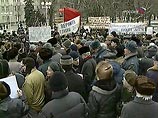Putin's rating hits all-time low as retirees continue massive protests
Russian people say that they do not see anyone else, whom they could trust

Questions connected with the notorious law about the elimination of state benefits have become most important for the Cabinet of Ministers lately. Prime Minister Mikhail Fradkov promised to conduct regular special sessions regarding the current social situation in Russia. It is obvious, however, that it will not be an easy goal for governmental officials to pursue: retirees still go out on protest meetings despite certain concessions that have been made. 
Meetings of protest still occur in Russia nationwide – in Vladimir, Perm, Kurgan, Nizhni Novgorod, Tomsk, Siktivkar, etc. Displays of people's anger are becoming more radical: elderly people storm city administrations; others go to a post office to send 200-ruble “tips” back to the president. Two hundred rubles is less than $10 – this is the amount that the Russian government assigned to each Russian pensioner as a compensation for the welfare benefit cutoff. In Nizhni Novgorod, pensioners hung the president's dummy on a tree.
The Russian opposition – the Communist Party, Yabloko factions and leftist movements are doing their best to retrieve their erstwhile popularity in the masses. They realize that they might not have a better chance to gain the political significance in the Russian society.
A complete compensation of the benefits is not scheduled in the Russian budget for the current year. Furthermore, Russia might experience a new wave of inflation taking into consideration the forthcoming raise of pensions in March: about 100 billion rubles will be brought in on the market.
Russian Finance Minister Aleksei Kudrin promised to hold the inflation rate within reasonable limits and even strive for its reduction. The minister said that the inflation would not “eat” the pension raise; it will be possible to pay high pensions owing to extra income of the budget. Excessive funds will be transferred to the Stabilization Fund, and it will therefore be possible to avoid the money supply pressure.
The pressure, however, is already becoming evident. According to the information received from the Federal State Statistics Service, production prices increased by 28 percent (one-third) in 2004. The “official” inflation rate in Russia is less than 12 percent. Specialists say that the inflation rate in January made up 1.9 percent due to state monopolies' desire to dictate production prices in the industrial field. If the Russian government does not cancel the law on welfare benefit cutoffs, it would be logical to presume that serious social uprisings are inevitable in the near future.
Current urgent measures to ease the social tension in Russia may turn out to be purely symbolical, although one may not say the same about a possible social and political crisis. According to a recent opinion poll, the number of Russian people, who disapprove Vladimir Putin's work on the post of the president, has doubled in comparison with January of 2004 – from 16 to 32 percent. It is noteworthy that Putin's rating was the highest in Russia in February of 2004: the president enjoyed the support of 82 percent of Russians. The rating dropped to 69 percent by the end of the year. The support is still high enough to talk about the phenomenon of Russian society's consolidation around Vladimir Putin: 65 percent of respondents said that they approved his presidential activity. The current percentage, however, is the lowest that Putin has ever had during his stay at power. It is worth mentioning that a lot of respondents said that they did not see anyone else, whom they could trust.
Subscribe to Pravda.Ru Telegram channel, Facebook, RSS!


